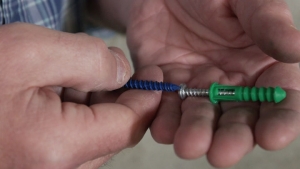Replacing a Central Air Conditioning System
Replace Your Old Central Air Conditioning System with a New Model That Is Quieter and More Energy Efficient
Hire a professional HVAC company to replace your failing central air conditioning system with a new system that is quieter and more efficient. The pros are licensed to work with air conditioning refrigerants. They can size/install a new outside condensing unit, inside air handler, duct work, and components such as a high-efficiency air filter, humidifier and dehumidifier.
Read More
Capture the Air Conditioner Refrigerant and Remove the Condensing Unit
Capture the old refrigerant in a pressurized tank for proper disposal. A license is required to handle air conditioner refrigerant to prevent its escape and subsequent harm to the ozone layer. Disconnect the empty lines and remove the condensing unit.

Set the New Air Conditioner Condenser on a Concrete Pad
Tamp the ground fort a concrete pad for the air conditioner condensing unit. Use a bar level to ensure the pad is level from front to back and side to side. All home air conditioner equipment should be level.

Remove the Old Air Handler and Position the New Model
Remove old equipment and stack/cover concrete blocks to bear the weight of the air handler. Add sound/vibration absorbing pads on top, followed by a drip pan. Set the new unit on smaller blocks in the bottom of the pan.

Add a High-efficiency Air Filtration System to the Air Conditioner
Install a high-efficiency air filtration system on the air conditioning system that can remove more than 99% of the contaminants from the air. It effectively removes dust, pollen bacteria, mold spores, pet dander, and smoke.

Install Main Duct Work for the Air Conditioning System
Secure sections of ducts with slender sheet metal drivers. Insulate ducts closest to the air handler with anti-microbial foam rubber. Add an insulator to prevent noise/vibration. Seal air conditioner metal ductwork joints and insulation seams with metallic tape.

Complete Branch Ducts and Tie in Return Air Duct
Secure round metal ducts to the main ducts and to insulated flexible ducts that deliver air to individual vents within the home. Secure them with plastic ties and screws. Connect return air duct to incoming side of air handler.

Cut Opening in Supply Duct and Install the Humidifier
Cut an opening in the air conditioner supply duct and install a collar and humidifier. It will keep the moisture level inside the house at a more comfortable level during winter months when the air is dried by heating.

Mount Brackets/Platform and Install the Dehumidifier
Add a dehumidifier to extract moisture from the air supply during summer months when the humidity is high. Connect the dehumidifier to the main system with round metal ducts. Use a crimper to fit duct lengths together. Secure with screws.

Install Insulated Copper Tubing for the Air Conditioner Refrigerant
Run insulated copper refrigerant tubing between the inside air handler and the outside condensing unit. Seal the joints with high temperature solder to make them completely leak-proof.

Remove Air from Copper Lines and Fill with Refrigerant
Remove air from the sealed copper tubing that runs between the air handler and condenser. A vacuum pump draws the air out. Fill the emptied lines with the correct poundage of refrigerant for the size of your air conditioning system.
Blog Articles
Have You Heard of Landscape Glue?
You love the rustic charm of a gravel walkway, but the constant scattering of stones across your lawn and patio can be a real headache. Whether it’s from pets, lawn mowers, or just foot traffic, it seems impossible to keep those stones in place. Sound familiar? Well, Brian shows us a simple DIY method using landscape glue to keep your gravel path looking pristine and, more importantly, in place.
How to Remove Candle Wax Drips: Two Effective Methods
Candles create a warm and inviting atmosphere, but those pesky wax drips can be a real headache. Luckily, Brian shows us a couple of effective methods to tackle this issue, and they involve two very different temperatures: hot and cold. Here, we'll explore two effective methods: one using cold and the other using heat.
Guide to Hanging on Masonry Walls
Ever wondered how to hang that picture frame or shelf on a brick or concrete wall? It can seem daunting, but with the right tools and techniques, it's a straightforward DIY project. This guide breaks down two common methods: using concrete screws and using anchors, making it easy for you to tackle your next hanging project.





